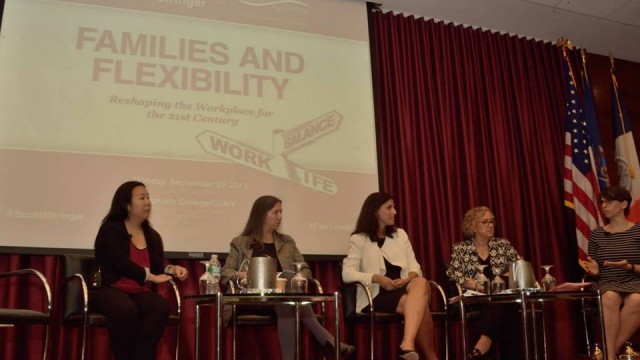Reposted from A Better Balance.
Yesterday, A Better Balance and New York City Comptroller, Scott Stringer, brought together an incredible group of panelists to discuss “Families and Flexibility: Reshaping the Workplace for the 21st Century.”
Comptroller Stringer set the tone for the event by pointing out how many of our work policies are based on archaic ideas. Many unchanged practices (such as inflexible scheduling) only make sense if there is a spouse staying at home to take care of children, ailing relatives, and to keep the household. In the 21st century, this dynamic rarely exists, yet many workplaces have failed to adapt to the changing times. Comptroller Stringer challenged the packed audience to spur a cultural change in how we think about work – a change that would lead to common sense adjustments for working in the modern era.
The first panel, moderated by Rachel Swarns of the New York Times, established a solid economic argument for flexible scheduling for workers at all income levels. A Better Balance’s own Dina Bakst presented several examples of workers who were forced out of their jobs due to inflexible schedules, while CUNY’s Janet Gornick explained that the United States lags far behind the rest of the world in legislating the right to request alternative work schedules.
Barbara Wankoff of KPMG and Marcee Harris Schwartz of BDO explained their companies’ flexible polices that allow employees the freedom to succeed at work and at home, and create more productive and loyal workers. They also highlighted considerable cost savings from flexibility in expected (lower turnover) and unexpected places (real estate savings when fewer employees are in the office at the same time). Kelly Sakai-O’Neill of the Families and Work Institute, further described how these types of policies are a win-win for employees and businesses.
The second panel of the day – moderated by Steven Greenhouse of the New York Times – tackled the issue of how to build a broad workplace agenda. ABB advocate Dena Adams moved the crowd with her heartbreaking story of having to choose between her job and her child – a choice she doesn’t want anyone else to have to face. The inflexibility of her former employer spurred her to remark that “I can do both jobs: I can be a very good mother and an excellent worker – if I’m given the chance.” In contrast, Carrie Nathan spoke about how her Union (RWDSU Local 1-S) has helped make Macy’s the type of flexible employer that has earned over 30 years of loyalty from her.
Eminent researcher, Ruth Milkman, explained how pro-worker and pro-flexibility laws have helped cities like San Francisco and Seattle to prosper, while A Better Balance’s Sherry Leiwant called on New York City to become a leader in this area. As Ms. Leiwant pointed out, laws protecting employee rights to ask for flexibility and to know their schedule in advance empower workers and give them the opportunity to find work-life balance.
Anne-Marie Slaughter, President and CEO at the New America Foundation, wrapped up the discussion with an inspiring keynote address. She reiterated much of what the panelists had discussed and used examples from her own life to capture the importance of giving workers flexibility to succeed at home and in the workplace.
We hope that the conversation started yesterday will continue throughout the City in the months to come, and lead to tangible policy change for New Yorkers. We will be working hard to make that happen, so please stay tuned!


